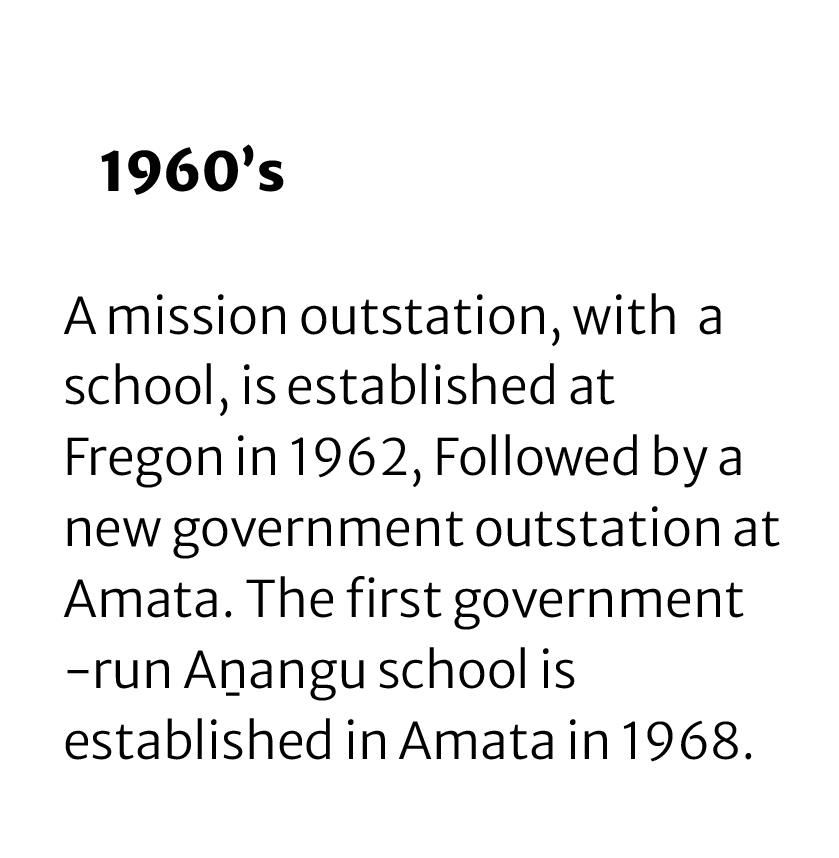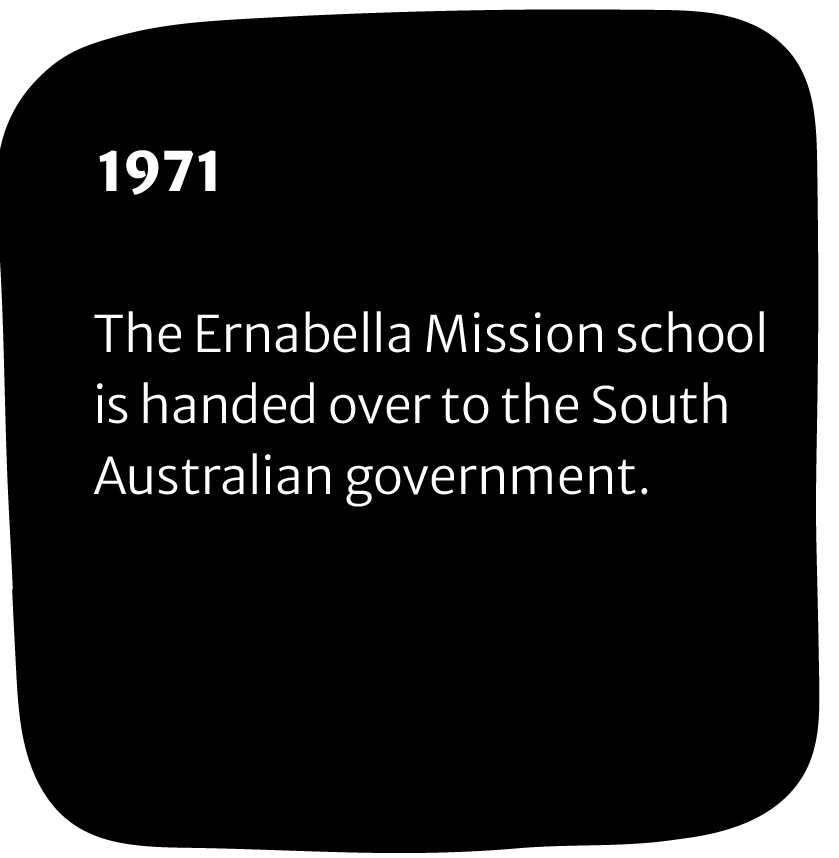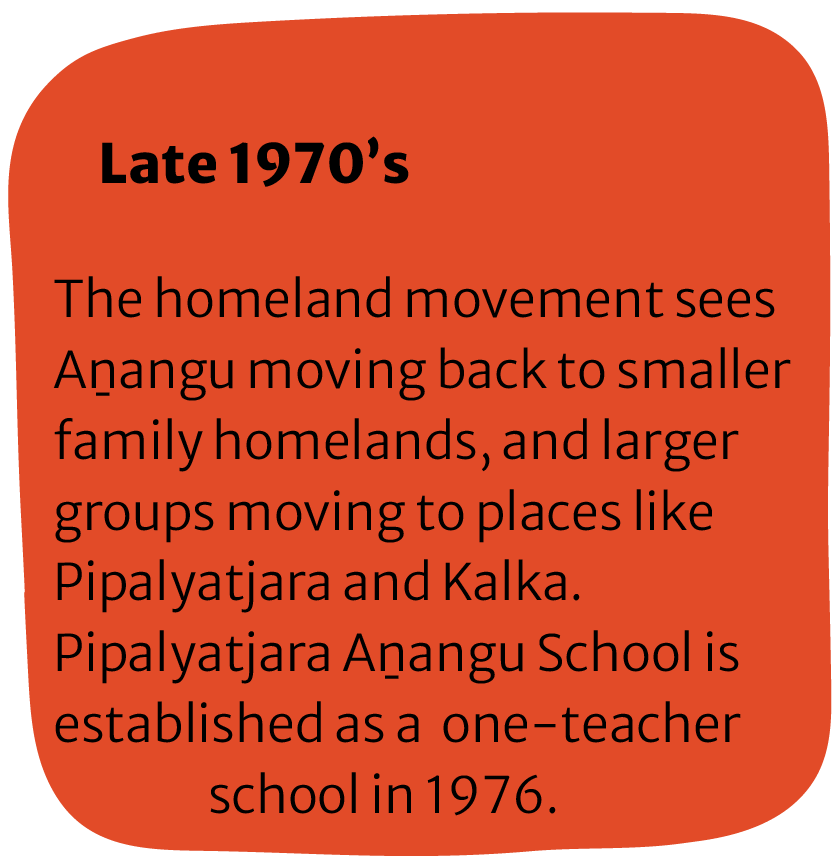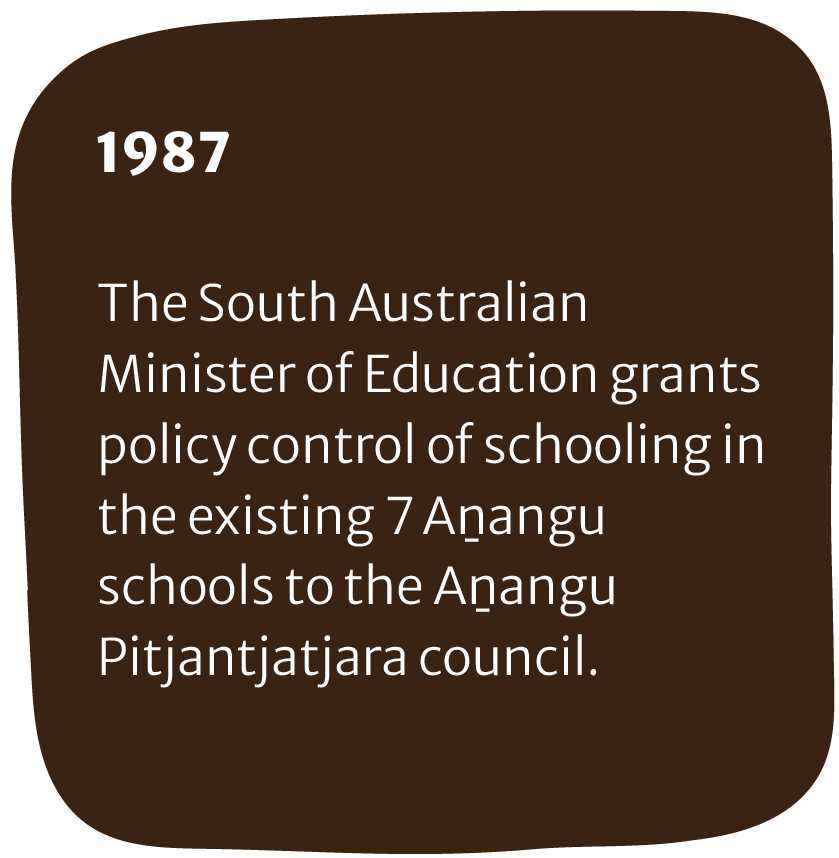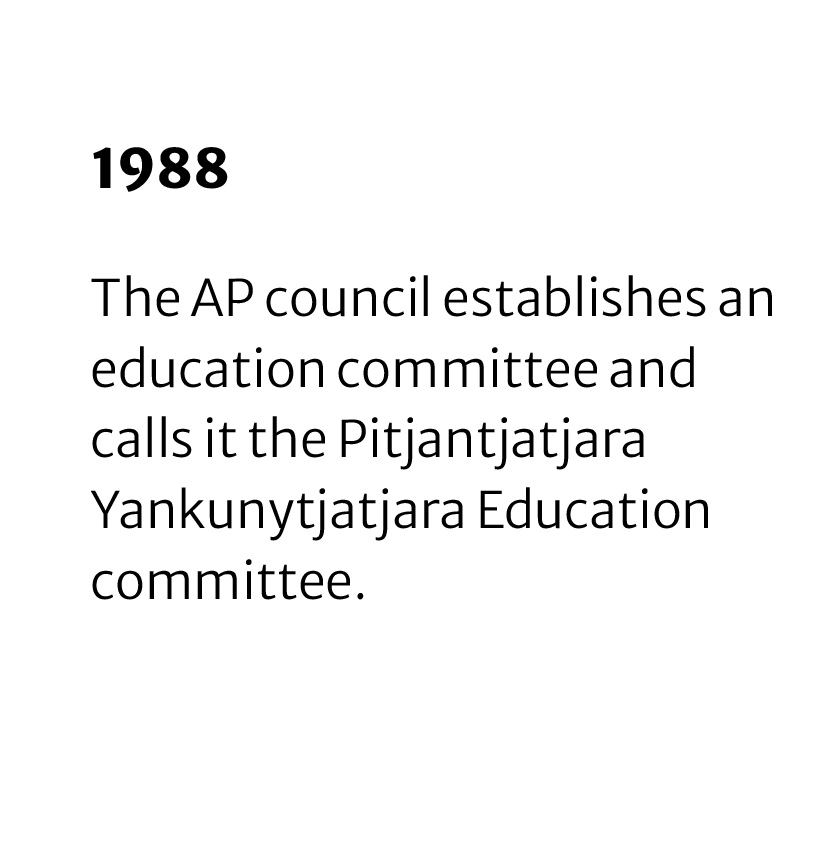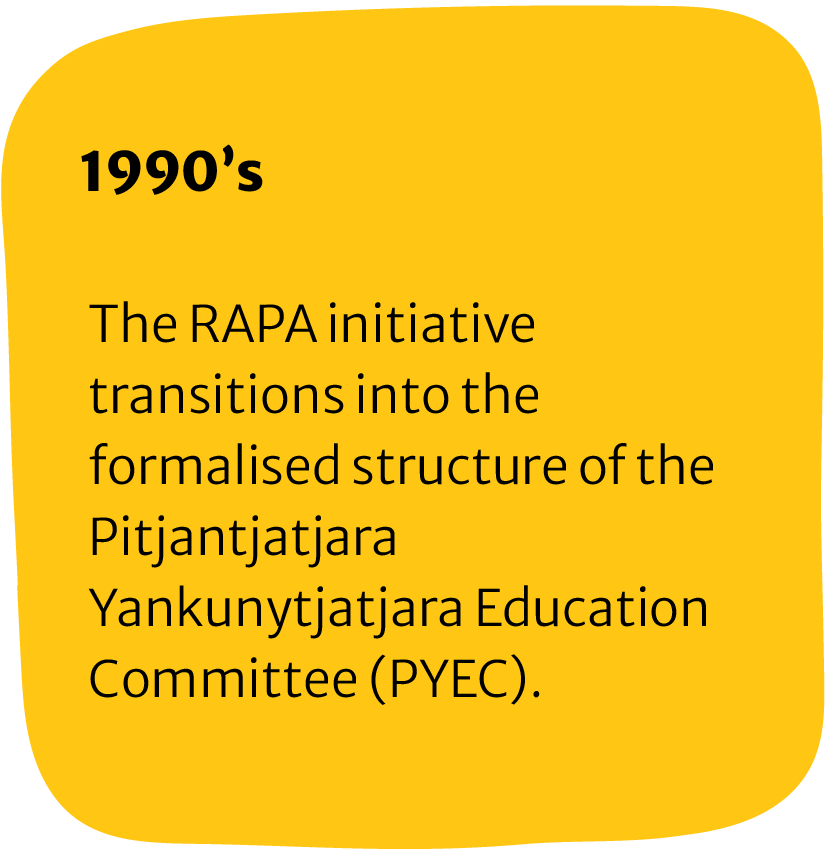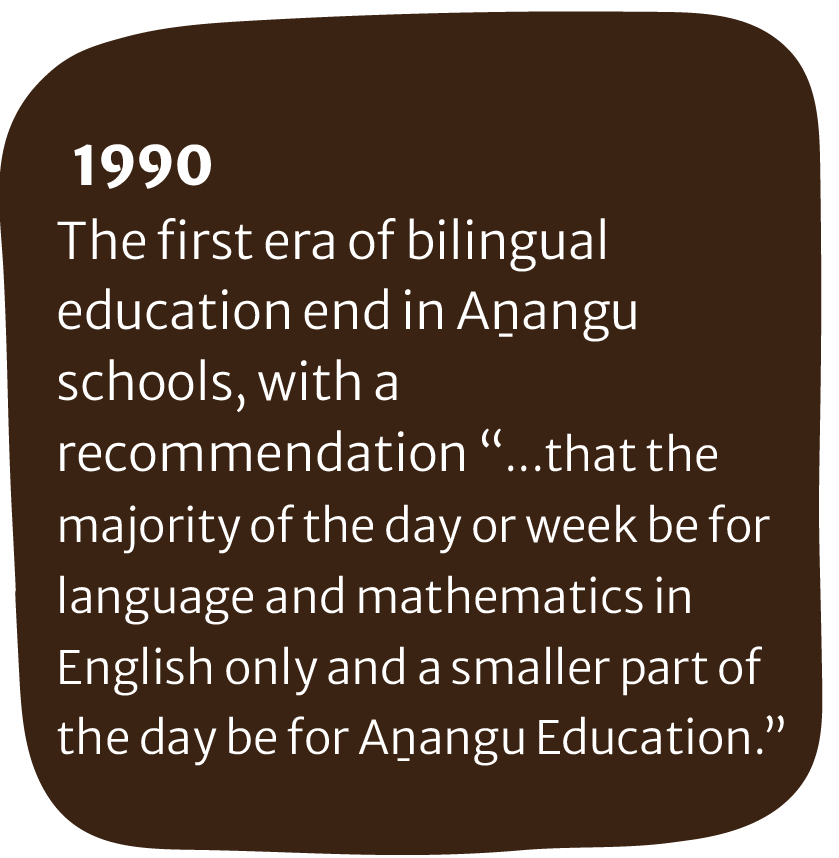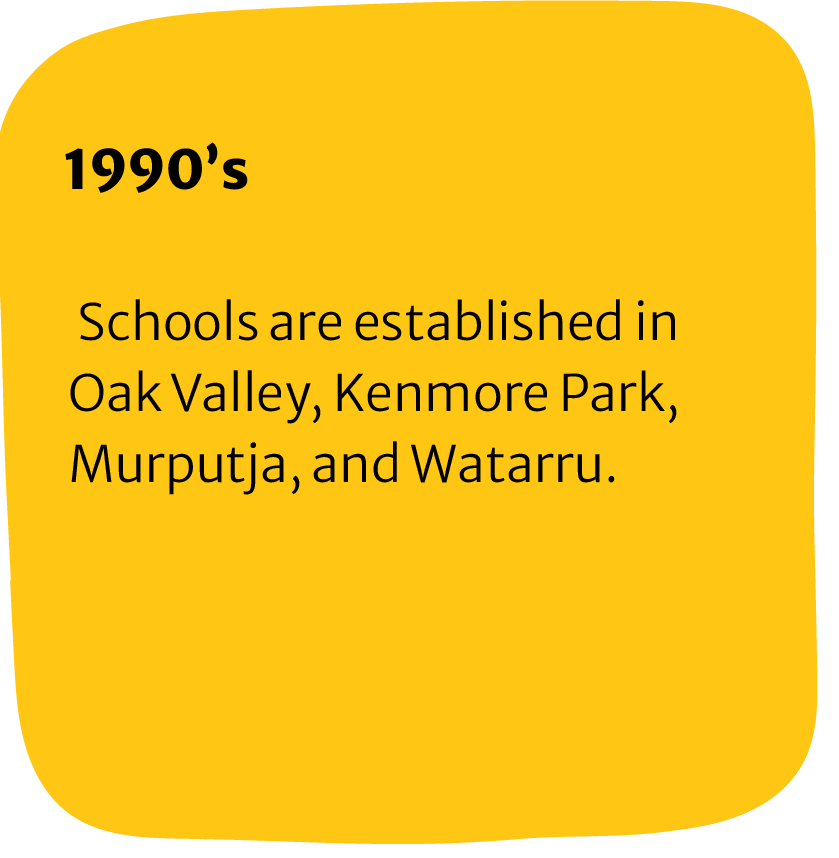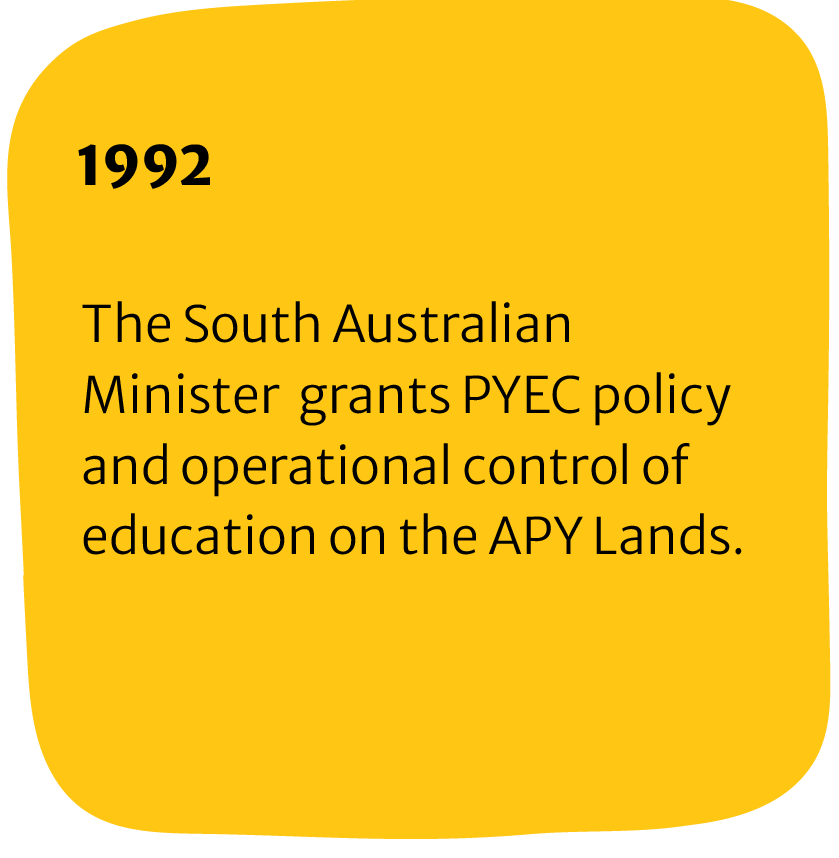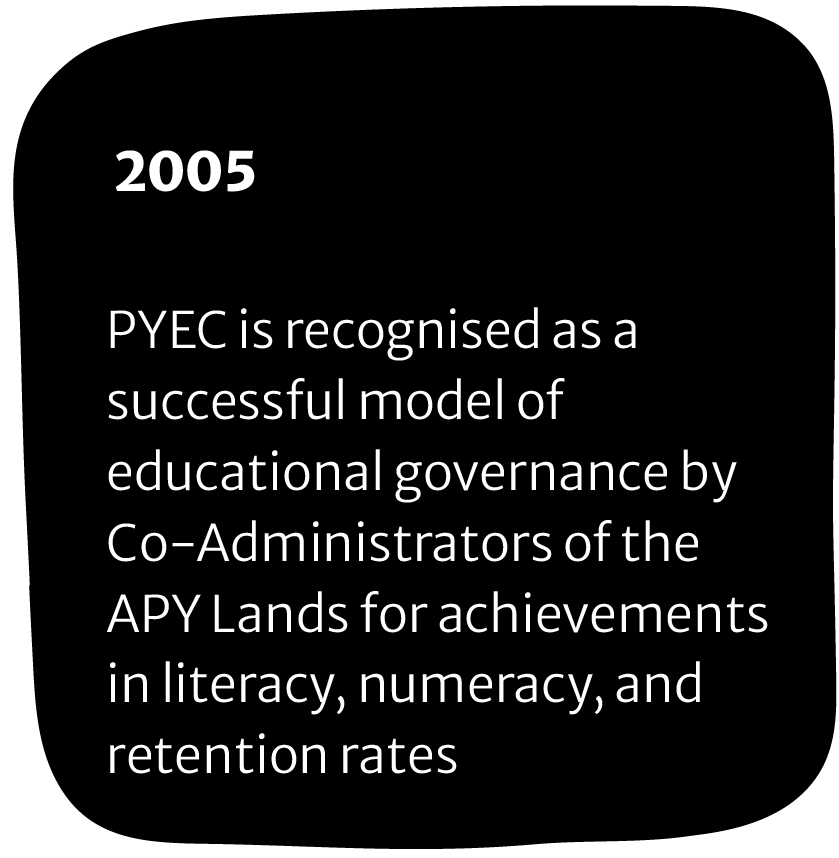WHERE WE WORK

AṈANGU
SCHOOLS
INDULKANA Aṉangu School
Birth to Year 12
Kuṉpu wangaṉara nintiringkupai.
Strong, smart and respectful learners are the school values which are at the heart of everything at Indulkana School.
Early learning programs are provided through the Family Centre (Birth to 3 years old) and the Preschool (3-5 years).
Students, staff and families work together to ensure that all who attend our school have the knowledge and skills to be able to ‘walk in both worlds’.
The majority of students at Indulkana are bilingual or multilingual and their first language is Pitjantjatjara or Yankunytjatjara.
ERNABELLA Aṉangu School
Birth to Year 12
Over 90% of students at Ernabella are Aṉangu and their first language is Pitjantjatjara or Yankunytjatjara.
The aim of Ernabella School is to provide Aṉangu with the necessary skills and abilities to be self-determining.
The Early Years program is run through the Family Centre (Family and birth-3) and the Pre-school (3-5 year olds).
Ernabella Aṉangu School Mission: We work with and for the community, to provide choice, voice, and a fulfilled life for all children.
Birth to Year 12
MURPUTJA Aṉangu School
Murputja Aṉangu School was established in 1993 and children from the communities for Kanpi, Nyapari, Angatja Homelands and Watarru attend.
Most students are Aṉangu, speaking Pitjantjatjara as a first language and have a strong connection to their cultural identities.
The school has a strong focus on student wellbeing to enable engagement in learning in key subject areas of Pitjantjatjara, English, Mathematics and Science. Other subjects are taught using an integrated approach with clear links to literacy, numeracy and inquiry.
Kuṉpu | Ninti | Rapa | Rikina - Strong | Smart | Brave | Rikina
MIMILI Aṉangu School
Birth to Year 12
Mimili School aligns to the PYEC recommendations of two Pitjantjatjara and Yankunytjatjara lessons per week for all students.
The school recognises the importance of teaching students and celebrating their success in their first language. Teachers and AEWs teach Pitjantjatjara sight words daily using a sight word display. The predominant languages at Mimili are Pitjantjatjara and Yankunytjatjara, with student usually being introduced to English when they start school.
Mimili Aṉangu School vision is Working together for great starts and strong futures.
KENMORE PARK Aṉangu School
Birth to Year 12
“Kenmore Park Aṉangu School-angka nganaṉa palyalpai kuṉpungku, kulintja wiru, nintingku kulilpai kulintja kuṉpu ngura nganampa nganampa tjiti tjuṯa ninti world-paku, palu ngurangka nyinapai. Tjana wiyaringkula ninti ngaranyi piranpaku munu Aṉanguku tjurkupa wangkaku”
“At Kenmore Park Aṉangu School we create confident, freethinking, problem solvers with strong connections to our community and land. Our students are globally aware, yet locally grounded. They graduate with the skills to successfully move freely between Piranpa and Anangu worlds”.
Kenmore Park Aṉangu School is located on a working cattle station, Kenmore Park with access to a local orchard which is highly valued by the community.
PIPALYATJARA Aṉangu School
Birth to Year 12
The school was opened in 1976 as a one teacher school and now has 10 teachers and 10 support staff, and a preschool and playgroup is run every school day for 0-3 year olds and their parents.
Working and learning together to create strong beginnings and strong futures is the school’s vision.
Most students speak Pitjantjatjara or Yankunytjatjara as their first language and are introduced to English at school. They come from the communities of Pipalyatjara and Kalka, and through the First Language Maintenance and Development Program they have three Pitjantjatjara language and literacy lessons every week.
FREGON Aṉangu School
Birth to Year 12 | Preschool and Playgroup
Fregon school follows the value Kuṉpu Nintiringkunytjaku - for strong learning - and involves families in all aspects of its operations.
PYEC ensures that community members and families participate in setting the activities for learning, enabling a strong focus on culture.
Students at the school predominantly speak Pitjantjatjara as their first language
The preschool and playgroup operate within the Child Parent Centre.
AMATA Aṉangu School
Birth to Year 12 | Preschool and Playgroup
Most students at Amata are Aṉangu and speak either Pitjantjatjara or Yankunytjatjara as their first language. English is often only spoken at school.
Teaching and learning at Amata are built on strong relationships and a deep commitment to working together. Aṉangu educators and teachers plan and teach side-by-side, combining cultural knowledge and curriculum expertise to create learning that is relevant, respectful, and responsive.
The school provides a tailored curriculum grounded in culturally appropriate pedagogies, supporting students to grow strong in both worlds - proud in culture, confident in learning, and prepared for the future.
OAK VALLEY Aṉangu School
Birth to Year 12
Oak Valley Aṉangu School runs a playgroup, preschool, primary, and secondary programs. The school is in a very remote community set on the edge of the Great Victorian Desert and home to some of the most sacred land in Aṉangu culture.
The students generally speak English as a second or third language.
Nintiringkunytjaku (I’m going to learn) is embedded in the school culture and the official vision is Great start, strong futures, empowered communities.
The overarching goal of the school is to improve the learning outcomes of all students with recognition of the importance of culture and traditions.
The current school building has been open since 2003.
Yalata Aṉangu School
Birth to Year 12
‘Be Safe, Be Respectful and Be a Learner’ are the values that underpin everything Yalata Aṉangu School strives for.
The school provides programs that promote active participation and outcomes for students in a safe, supportive and well-resourced learning environment.
Families at the school come from a range of communities including Yalata, Oak Valley, Ceduna and Tjuntjuntjara in Western Australia.
The predominant language is Southern Pitjantjatjara with English as a second or third language and the staff are a strong team of both Aṉangu and Piranpa educators. Each learning space has a teacher and an Aṉangu Educator who plan and program together to provide a culturally responsive and engaging program.
WILTJA Aṉangu Programs
Secondary
Wiltja Boarding provides culturally responsive care and learning opportunities for secondary-aged Anangu students who choose to pursue their education at Avenues College in Adelaide.
Aṉangu envision Wiltja as a place where students can reach their full academic and social potential in a culturally respectful environment. They aspire for their children to confidently shape their futures, both on and off Country.
To support this vision, Wiltja Boarding is dedicated to creating a highly supportive residential and learning environment where every student is valued, and their education, recreation, health, and wellbeing remain the highest priority.
At Wiltja Boarding, students are supported by highly experienced youth workers and other staff who are dedicated to the student’s wellbeing and success. The Wiltja team is fully committed to providing strong support for both students and their families.
COMMUNITY
The Aṉangu Pitjantjatjara Yankunytjatjara (APY) Lands, Maralinga Tjarutja Lands and Yalata Lands are home to a network of strong and connected communities, each with its own unique identity, history, and connection to Country. These communities are not just places on a map—they are living, breathing expressions of Aṉangu culture, language, and traditions
Life in these communities is deeply tied to the land, with stories, songlines, and knowledge passed down through generations, shaping the way Aṉangu live, learn, and connect with the world around them.
Each community is committed to ensuring their children receive an education that reflects their culture, language, and aspirations in way that nurtures and strengthens Aṉangu identity,
PYEC plays a central role in uniting these communities and ensuring that Aṉangu voices are at the heart of all decisions about education. PYEC was established to give Aṉangu control over their children’s education, and it continues to provide governance and leadership for schools across the APY Lands, Yalata and Oak Valley. By working closely with local communities, PYEC ensures that education is culturally relevant, bilingual, and aligned with the needs and aspirations of Aṉangu families.
CULTURE
Aṉangu culture stands on the foundations of Tjukurpa, Ngura (Country), and Walytjapiti (Kinship). These foundations have been expressed from the deep past to the present day through Wangka (language) and Inma (song and ceremony).
Aṉangu learn through all of their kinship connections, and especially through tjamu kami (grandparents). From birth they are practising the Aṉangu pedagogy of Nyawa! (Watch) Kulila! (Listen) and Arkala! (Mimic). Aṉangu children are given a great deal of autonomy when they are young, and are expected to think for themselves and take responsibility for younger siblings.
Aṉangu families connect to specific places, and hold responsibility for their care and the preservation of Tjukurpa. They take great pride and joy in performing and teaching inma connected to those places.
PYEC empowers Aṉangu families and communities to centre their culture in education, by supporting community engagement in schools, Learning on Country, bilingual education and Aṉangu governance.
HISTORY
PYEC exists today because of the determination of Aṉangu communities to take control of their children’s education. Its roots trace back to the 1970s and 1980s, when Aṉangu leaders worked together to strengthen connections between schools across the APY Lands, sharing curriculum, literacy, and numeracy approaches. Supported by the Commonwealth’s Remote Area Projects fund (RAPA), these efforts laid the foundation for a regional education model.
In 1992, PYEC was granted policy and operational control of education on the APY Lands by the South Australian government, marking a significant step towards Aṉangu self-determination.
Over the years, PYEC has strengthened its governance, improved educational outcomes, and empowered Aṉangu educators and communities.
PYEC continues to provide governance and leadership for Aṉangu schools, advocating for and supporting the delivery of and facilitating participation in education - empowering Aṉangu communities and ensuring their voices remain strong and central to shaping education in the Lands.
PYEC history timeline

















